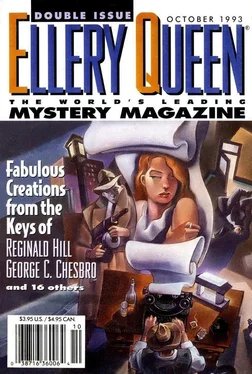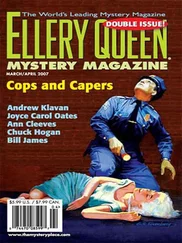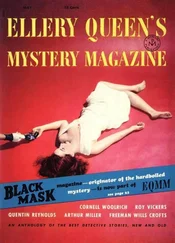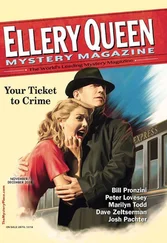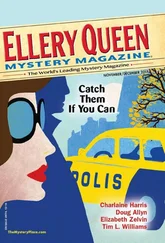Charles Ardai - Ellery Queen’s Mystery Magazine. Vol. 102, No. 4 & 5. Whole No. 618 & 619, October 1993
Здесь есть возможность читать онлайн «Charles Ardai - Ellery Queen’s Mystery Magazine. Vol. 102, No. 4 & 5. Whole No. 618 & 619, October 1993» весь текст электронной книги совершенно бесплатно (целиком полную версию без сокращений). В некоторых случаях можно слушать аудио, скачать через торрент в формате fb2 и присутствует краткое содержание. Город: New York, Год выпуска: 1993, Издательство: Davis Publications, Жанр: Детектив, на английском языке. Описание произведения, (предисловие) а так же отзывы посетителей доступны на портале библиотеки ЛибКат.
- Название:Ellery Queen’s Mystery Magazine. Vol. 102, No. 4 & 5. Whole No. 618 & 619, October 1993
- Автор:
- Издательство:Davis Publications
- Жанр:
- Год:1993
- Город:New York
- ISBN:нет данных
- Рейтинг книги:3 / 5. Голосов: 1
-
Избранное:Добавить в избранное
- Отзывы:
-
Ваша оценка:
- 60
- 1
- 2
- 3
- 4
- 5
Ellery Queen’s Mystery Magazine. Vol. 102, No. 4 & 5. Whole No. 618 & 619, October 1993: краткое содержание, описание и аннотация
Предлагаем к чтению аннотацию, описание, краткое содержание или предисловие (зависит от того, что написал сам автор книги «Ellery Queen’s Mystery Magazine. Vol. 102, No. 4 & 5. Whole No. 618 & 619, October 1993»). Если вы не нашли необходимую информацию о книге — напишите в комментариях, мы постараемся отыскать её.
Ellery Queen’s Mystery Magazine. Vol. 102, No. 4 & 5. Whole No. 618 & 619, October 1993 — читать онлайн бесплатно полную книгу (весь текст) целиком
Ниже представлен текст книги, разбитый по страницам. Система сохранения места последней прочитанной страницы, позволяет с удобством читать онлайн бесплатно книгу «Ellery Queen’s Mystery Magazine. Vol. 102, No. 4 & 5. Whole No. 618 & 619, October 1993», без необходимости каждый раз заново искать на чём Вы остановились. Поставьте закладку, и сможете в любой момент перейти на страницу, на которой закончили чтение.
Интервал:
Закладка:
Later in the day, in what is offensively called the “smoke room” of the hotel, a murmured conversation between the two went on for some time.
“How much do you really know about that thing, and where it came from?”
“Honest, Mr. Dillet, I don’t know the ’ouse. Of course, it came out of the lumber room of a country ’ouse — that anyone could guess. But I’ll go as far as say this, that I believe it’s not a hundred miles from this place. Which direction and how far I’ve no notion. I’m only judging by guesswork. The man as I actually paid the cheque to ain’t one of my regular men, and I’ve lost sight of him; but I ’ave the idea that this part of the country was his beat, and that’s every word I can tell you. But now, Mr. Dillet, there’s one thing that rather physicks me. That old chap — I suppose you saw him drive up to the door — I thought so: now, would he have been the medical man, do you take it? My wife would have it so, but I stuck to it that was the lawyer, because he had papers with him, and one he took out was folded up.”
“I agree,” said Mr. Dillet. “Thinking it over, I came to the conclusion that was the old man’s will, ready to be signed.”
“Just what I thought,” said Mr. Chittenden, “and I took it that will would have cut out the young people, eh? Well, well! It’s been a lesson to me, I know that. I shan’t buy no more dolls’ houses, nor waste no more money on the pictures — and as to this business of poisonin’ grandpa, well, if I know myself, I never ’ad much of a turn for that. Live and let live: that’s bin my motto throughout life, and I ain’t found it a bad one.”
Filled with these elevated sentiments, Mr. Chittenden retired to his lodgings. Mr. Dillet next day repaired to the local Institute, where he hoped to find some clue to the riddle that absorbed him. He gazed in despair at a long file of the Canterbury and York Society’s publications of the parish registers of the district. No print resembling the house of his nightmare was among those that hung on the staircase and in the passages. Disconsolate, he found himself at last in a derelict room, staring at a dusty model of a church in a dusty glass case: Model of St. Stephen’s Church, Coxham, Presented by J. Merewether, Esq., of Ilbridge House, 1877. The work of his ancestor James Merewether, d. 1786. There was something in the fashion of it that reminded him dimly of his horror. He retraced his steps to a wall map he had noticed, and made out that Ilbridge House was in Coxham Parish. Coxham was, as it happened, one of the parishes of which he had retained the name when he glanced over the file of printed registers, and it was not long before he found in them the record of the burial of Roger Milford, aged seventy-six, on the eleventh of September, 1757, and of Roger and Elizabeth Merewether, aged nine and seven, on the nineteenth of the same month. It seemed worthwhile to follow up this clue, frail as it was; and in the afternoon he drove out to Coxham. The east end of the north aisle of the church is a Milford chapel, and on its north wall are tablets to the same persons; Roger, the elder, it seems, was distinguished by all the qualities which adorn “the Father, the Magistrate, and the Man”: the memorial was erected by his attached daughter Elizabeth, “who did not long survive the loss of a parent ever solicitous for her welfare, and of two amiable children.” The last sentence was plainly an addition to the original inscription.
A yet later slab told of James Merewether, husband of Elizabeth, “who in the dawn of life practised, not without success, those arts which, had he continued their exercise, might in the opinion of the most competent judges have earned for him the name of the British Vitruvius: but who, overwhelmed by the visitation which deprived him of an affectionate partner and a blooming offspring, passed his Prime and Age in a secluded yet elegant Retirement: his grateful Nephew and Heir indulges a pious sorrow by this too brief recital of his excellences.”
The children were more simply commemorated. Both died on the night of the twelfth of September.
Mr. Dillet felt sure that in Ilbridge House he had found the scene of his drama. In some old sketchbook, possibly in some old print, he may yet find convincing evidence that he is right. But the Ilbridge House of today is not that which he sought; it is an Elizabethan erection of the forties, in red brick with stone quoins and dressings. A quarter of a mile from it, in a low part of the park, backed by ancient, stag-horned, ivy-strangled trees and thick undergrowth, are marks of a terraced platform overgrown with rough grass. A few stone balusters lie here and there, and a heap or two, covered with nettles and ivy, of wrought stones with badly carved crockets. This, someone told Mr. Dillet, was the site of an older house.
As he drove out of the village, the hall clock struck four, and Mr. Dillet started up and clapped his hands to his ears. It was not the first time he had heard that bell.
Awaiting an offer from the other side of the Atlantic, the dolls’ house still reposes, carefully sheeted, in a loft over Mr. Dillet’s stables, whither Collins conveyed it on the day when Mr. Dillet started for the seacoast.
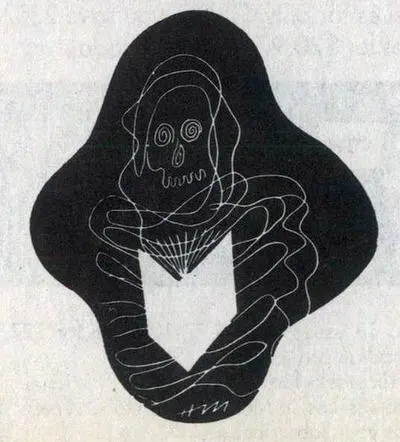
Masks
by Charles Ardai
© 1993 by Charles Ardai
Charles Ardai is one of the youngest writers ever to have been published in EQMM, but his first association with our magazine was not as a contributor. Mr. Ardai came to work at Davis Publications, which then owned EQMM, at the age of sixteen, as a part-time assistant in the subsidiary rights department. Within a very short time he was submitting stories to both EQMM and Alfred Hitchcock Mystery Magazine and helping to compile anthologies of mystery fiction. He later attended Columbia University and makes his career in investment banking...
Night had fallen, and the sounds of carnival shook the walls with a hungry samba beat. The crowd in the street clapped and cheered and stamped its feet, drowning out the music. Firecrackers exploded and ricocheted from the rooftops. Men cheered. Women sang.
But inside the room, everyone was silent.
The three men who occupied the side of the room closest to the door sat with their hands on the arms of their chairs. One, a tall blond with his hair pulled back in a ponytail, gripped the armrests tightly. Another, a black man in a lightweight silk suit, drummed his fingers against the wood. He tapped steadily, slowly, patiently. The third man wore a sealskin jacket and American designer shoes and a bolo tie with a spider encased in amber for a clasp. He leaned forward and put all his weight onto his forearms, as though at any moment he might launch himself toward the man seated behind the desk.
The man behind the desk held his hands before him, his gloved fingers interlaced, his elbows resting lightly on the blotter. He wore a dark suit with a black shirt and a hat with a long brim. Beneath the brim, a sliver of skin peeked out above the top of a translucent plastic mask. The mask concealed and distorted his features. It was possible to tell that he was dark-skinned, but beyond that nothing could be told for certain.
The lips of the mask did not move even when the lips behind them finally did. The effect, of pink squirming behind the fixed lips of the fixed face, was unnerving. But if the other men found it so, they showed no sign.
“You are not the Jomon.” The voice was flat, muffled, deliberately unmodulated. The words hung in the air over the desk, the more lifeless for being underscored by the sound of music and laughter outside.
Читать дальшеИнтервал:
Закладка:
Похожие книги на «Ellery Queen’s Mystery Magazine. Vol. 102, No. 4 & 5. Whole No. 618 & 619, October 1993»
Представляем Вашему вниманию похожие книги на «Ellery Queen’s Mystery Magazine. Vol. 102, No. 4 & 5. Whole No. 618 & 619, October 1993» списком для выбора. Мы отобрали схожую по названию и смыслу литературу в надежде предоставить читателям больше вариантов отыскать новые, интересные, ещё непрочитанные произведения.
Обсуждение, отзывы о книге «Ellery Queen’s Mystery Magazine. Vol. 102, No. 4 & 5. Whole No. 618 & 619, October 1993» и просто собственные мнения читателей. Оставьте ваши комментарии, напишите, что Вы думаете о произведении, его смысле или главных героях. Укажите что конкретно понравилось, а что нет, и почему Вы так считаете.
